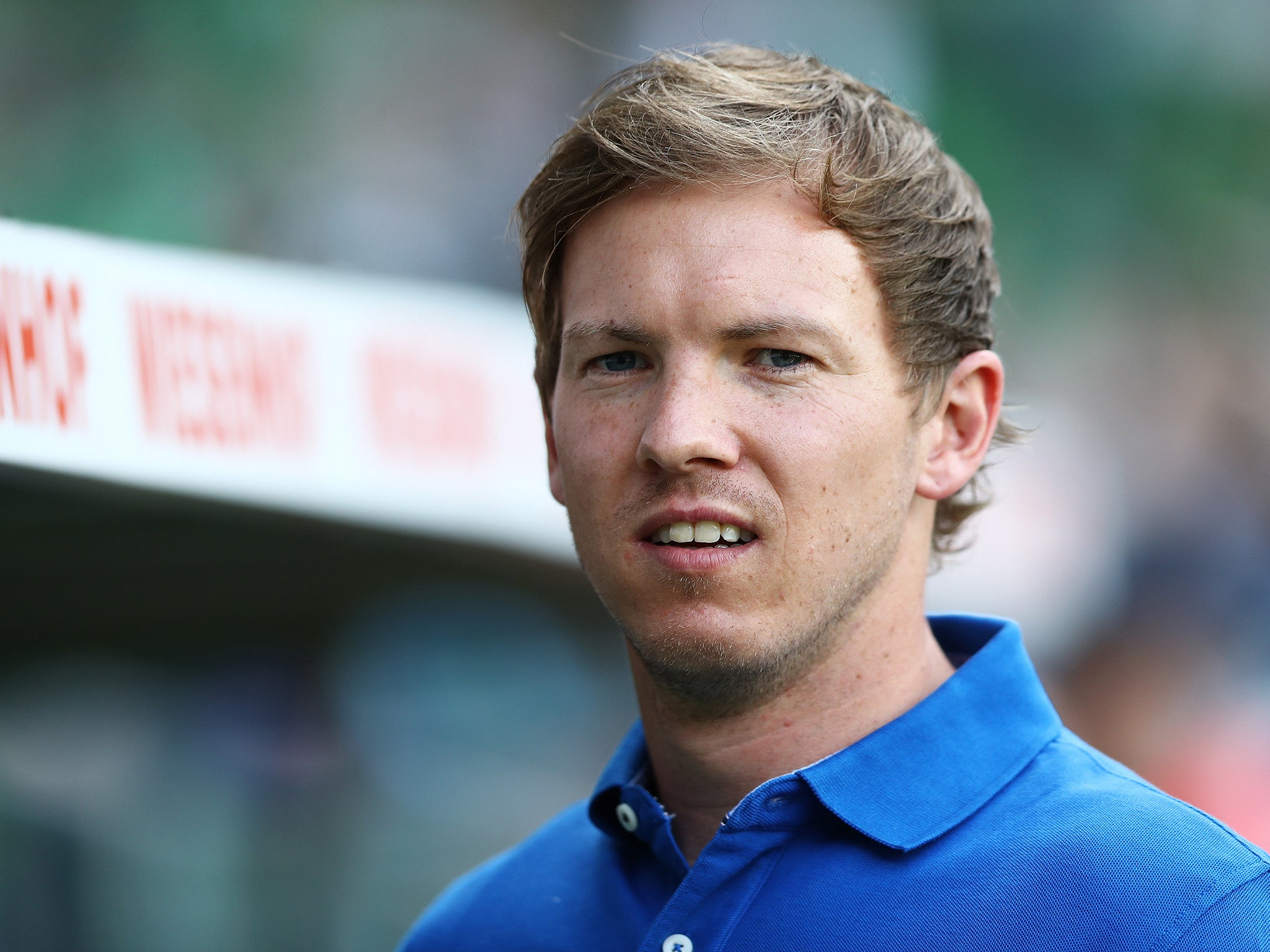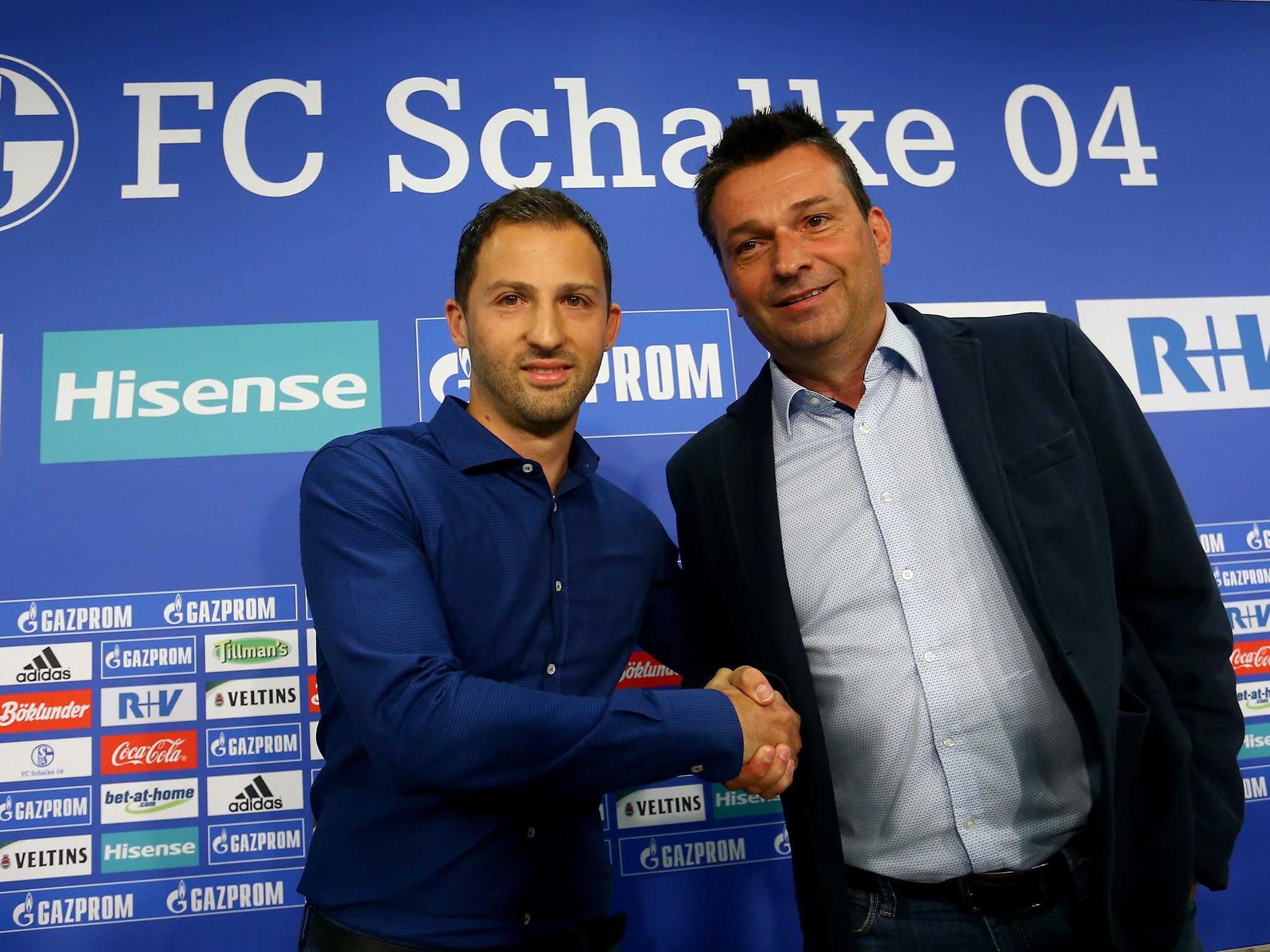Germany's youthful coaching revolution is showing the way forward in Europe
The 'second wave' of German football's renowned restructuring is here and it is not happening on the pitch, but in the dugout

At 39, Bournemouth coach Eddie Howe ranks as the Premier League’s youngest, but there is something you might not be aware of: Howe would only be the seventh youngest were he in charge of a Bundesliga club next season.
That is to say six of Germany’s 18 top flight teams will start the campaign in August with a coach in their thirties.
Compare the average ages of coaches from the other top five European leagues and Bundesliga coaches will next season be on average five years younger than their counterparts in England, France, Italy and Spain.
The likes of Augsburg’s Manuel Baum (37) or Werder Bremen’s Alexander Nouri (37) would hardly have rolled off the tongue of most German football fans even 12 months ago. Joining them this season is Hannes Wolf (36) who guided Stuttgart to promotion in his first campaign in charge. Sandro Schwarz (38) earned himself an internal promotion at Mainz, having been the club’s reserve-team coach.
Even younger is Domenico Tedesco (31) who’s taken charge of Schalke after keeping Aue afloat in the second tier and then there’s Hoffenheim’s Julian Nagelsmann (29). He took them to a Champions League qualification place in his first full season in charge and only turns 30 later this month.
Neither Nagelsmann nor any of his five fellow German compatriots had experience of being a Bundesliga coach prior to their current roles but each of them had worked in a Bundesliga youth academy, with four promoted directly from roles within their current club’s coaching set up to then head up the first team.
In other words, clubs are placing an emphasis on how coaches have been able to develop talent in the past. In some cases, that then allows the coaches to promote young talent that they’ve worked with in that club’s own academy – one such example with Nagelsmann at Hoffenheim is Nadiem Amiri, a European Under 21 Champion this summer with Germany.
Nagelsmann is the highest rated young coach in the country, perhaps even on the continent but it was only last year Tedesco finished above him at the notorious Hennes Weisweiler Academy, the national centre for training coaches in Germany based around 25 miles south of Cologne. There, Tedesco topped the class as they did their final coaching badges, gaining the licence needed to coach in the Bundesliga.
Within the past five years, Wolf, Nouri, Baum and Schwarz have also taken their Uefa Pro-licence, known as the Fussball-Lehrer course in Germany. That’s run by Frank Wormuth, the German FA’s head of coaching education.
“Our training of coaches sets the standard in Europe,” said Wormuth earlier this month, “because it is compulsory for clubs in the top three divisions to have academy centres, giving young coaches more chances. Those in charge of the clubs are giving younger coaches a chance quicker than in the past.”

Why that is the case is something Bayern Munich’s technical director Michael Reschke can answer. He’s responsible right now for smooth transfer coups such as the capture of James Rodriguez from Real Madrid on Tuesday but like Tedesco and Nagelsmann, he had a coaching career that began in his early twenties.
Reschke spent 35 years at Bayer Leverkusen in numerous roles but his start there came in the summer of 1979, just after the club’s first promotion to the Bundesliga. At 21, Reschke was made coach of the Under-17s, only after having impressed with the Under-12s of local club Viktoria Frechen where he’d been 16 when starting out.
It worked out quite well, given that in 1986, a 28-year-old Reschke ended up guiding Leverkusen to the Under-19 German national title. He was quite happy doing that job with no ambitions to become a Bundesliga coach. Maybe that’s because his age meant ‘there was no chance in this era’ to do so.
“At the time it was nearly always the same coaches who went from one club to another. It was more or less a closed shop,” says Reschke.
That win on the national stage with the Under-19s made Reschke the youngest ever coach to lift the title until Hoffenheim won it in 2014 with a 26-year-old Julian Nagelsmann.
Reschke had already heard good things about Nagelsmann by that point. Upon taking up his position at Bayern that same year, he and president Uli Hoeness met the young Hoffenheim coach in Munich ‘trying to convince him’ to become the club’s Under-19 coach.
What stood out was Nagelsmann’s ‘natural self-confidence’, that he was ‘very clear in his analysis and not one percent nervous sitting together with Uli Hoeness.’
It takes a special kind of personality, a special kind of knowledge in football, in tactics, in nutrition… that is all more important than the question of age.
In Reschke’s opinion, he would have gone to Munich had Hoffenheim given him the green light. Bayern were certainly keen. So Hoeness rang up his good friend, Dietmar Hopp, the Hoffenheim owner to talk about the possibility of Nagelsmann coming to Bayern. The answer, as Reschke put it, was not: “No, maybe.” It was: “No, no, no.”
Hopp had it in his mind that “not sooner or later but sooner or sooner,” Nagelsmann would become Hoffenheim coach and sure enough, he did in February 2016. The club looked doomed to relegation but with Nagelsmann’s assistance, they survived.
That along with his subsequent achievements at Hoffenheim has caused a Nagelsmann effect according to Reschke. The new understanding success stories like Nagelsmann’s gives to fans and the media makes it easier for other Bundesliga clubs to give younger coaches a chance.
Reschke names Nagelsmann alongside Liverpool manager Jürgen Klopp and former Dortmund boss Thomas Tuchel as ‘door openers’ for young coaches in Germany but it’s worth considering Schalke sporting director Christian Heidel in the equation. If Klopp and Tuchel helped open the door for others, then Heidel gave them the keys to do so.
It was Heidel’s idea during his time at Mainz to appoint a 33-year-old Klopp in 2001 and a 35-year-old Tuchel in 2009. Giving 31-year-old Domenico Tedesco a chance then is not breaking any new ground for him. That Sandro Schwarz was appointed by Mainz this summer could also be seen as part of his legacy.

Still, a factor bigger than Heidel or any possible Nagelsmann effect is German football’s renowned restructuring at the turn of the century. As alluded to by Wormuth, the DFB made it compulsory for each Bundesliga club to have a youth academy in 2000.
Reschke remembers that prior to that, in most clubs “maybe the Under-19s had a full time coach but the Under-17s had a part-time [coach] and the Under-15s had somebody doing it on top of their job. Now, you have a lot of Bundesliga clubs who have Under-13, Under-12, Under-11 coaches as professionals.”
The restructure led to better educated players and he believes that has also made it easier for younger coaches to break through.
“I think when you have players in football who became more intelligent, that think differently, that think in a special way because they have had a special education in the academy, then they are open minded to accept not only the age of a coach, not only what has gone before but also the ideas that a coach puts forward.”
Reschke underlines this all with ‘one but.’
“To be a good coach, it is not because you are younger or older. It takes a special kind of personality, a special kind of knowledge in football, in tactics, in nutrition… that is all more important than the question of age.”
He nevertheless concurs with an assessment made by Tuchel late in 2016 when he spoke about two waves.
The first wave was the sheer number of young players to emerge from Bundesliga academies after restructuring. Germany’s wins at the Confederations Cup and Euro Under-21s this summer certainly showed that strength in depth when it comes to young German talent.
Then, there was ‘an entirely natural delay’ before a second wave came, where the coaches responsible for bringing through those players were given a chance at the top level.
“The second wave is only just emerging now,” said Tuchel, then at Borussia Dortmund, with one member of that wave, Manuel Baum, sat beside him.
When you look at the amount of young Bundesliga coaches there are now on top of Baum, you’d say that second wave has come crashing in just eight months on.
Join our commenting forum
Join thought-provoking conversations, follow other Independent readers and see their replies
Comments
Bookmark popover
Removed from bookmarks